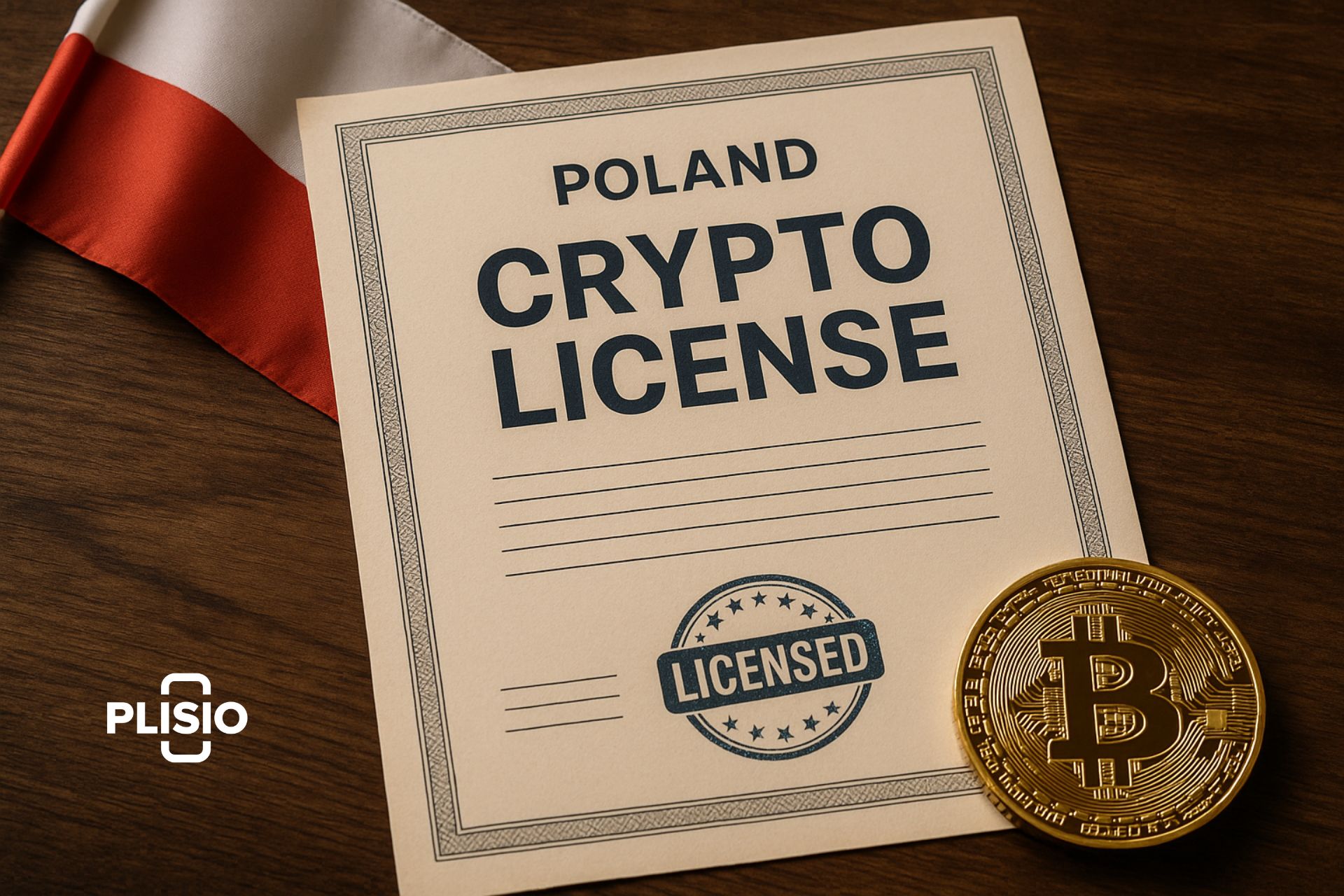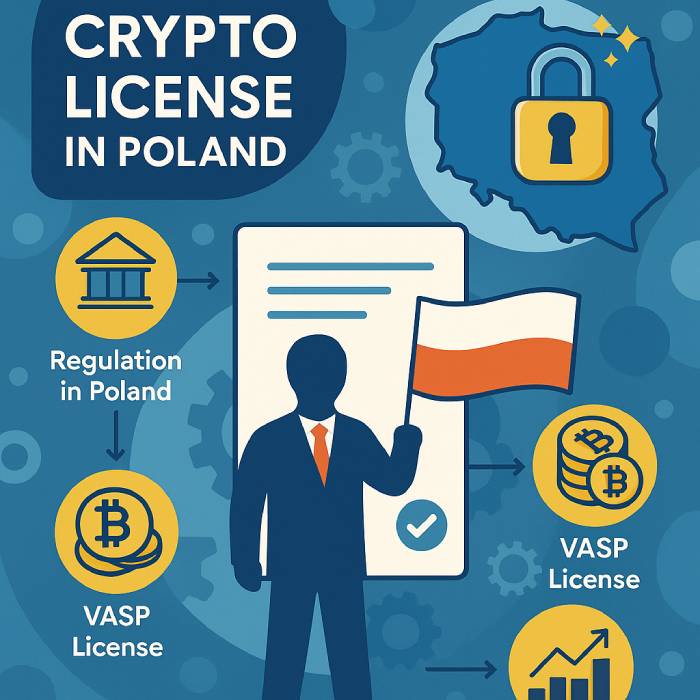Poland’s Evolving Crypto Landscape: A Complete Guide to the Polish Crypto License in 2025

Poland has quickly become one of Europe’s most active hubs for virtual currencies and digital‑asset innovation. As interest grows, so does the need for a clear regulatory pathway. In practice, operating a crypto business in Poland does not require a traditional "license"—instead, companies must secure registration or authorization depending on the type of crypto activities they offer.
With MiCA reshaping the European crypto market and Poland preparing to fully adopt the EU‑wide framework, entrepreneurs entering the cryptocurrency sector need a reliable overview of all requirements for obtaining a cryptocurrency license in Poland, joining the VASP register, and preparing for the future CASP license in Poland.
This guide explains the entire crypto licensing process in Poland in natural, accessible language—covering the registration of virtual currency activities, the upcoming MiCA‑aligned obligations, and the steps necessary to start a crypto company in Poland in 2025.
Crypto License in Poland 2025 — Key Highlights for Licensing in Poland
Recent 2025 statistics highlight how rapidly the Polish crypto market is expanding:
- As of Q1 2025, over 3.1 million Polish residents actively hold cryptocurrencies, a 22% increase compared to 2023.
- Poland now hosts 1,870+ registered VASP entities, making it one of the top three EU countries by number of crypto-registered companies.
- Annual transaction volume processed by Polish-based crypto firms exceeded €28 billion in 2024, according to industry reports.
- Over 37% of young adults (18–34) in Poland report using cryptocurrency for payments, trading, or savings.
- Crypto adoption among Polish SMEs grew by 15% in 2024, with more than 12,000 businesses accepting digital assets.
These metrics reflect Poland’s accelerating momentum as a European crypto hub ahead of the full MiCA rollout.
Poland’s current rules center on the Register of Virtual Currencies, which replaced traditional licensing with a faster, simpler compliance structure. Since the register’s creation in 2021, it has allowed more than 1,500 firms to be legally registered in Poland.
However, poland’s crypto regulation is now transitioning toward a full licensing model under MiCA, meaning businesses will need to comply with stricter EU‑wide standards.
Key points:
- Registration in the VASP register is mandatory for crypto activities in Poland.
- The system is based on AML rules and EU directives.
- The upcoming MiCA framework will replace simple registration with a formal CASP license in Poland.
- Crypto companies must meet new governance, capital, and compliance requirements.
Regulation in Poland: How Poland’s Crypto Market Evolves Toward CASP License Requirements
Cryptocurrencies in Poland have existed for more than a decade, but the regulatory response became serious after the EU updated AML rules. The 2021 amendments to the Polish AML Act formally introduced regulation for virtual currencies, aligning national rules with Directive 2018/843.
These rules aim to prevent misuse of cryptocurrencies for illicit purposes while supporting legitimate crypto businesses.
Poland is currently one of Europe’s most active crypto markets: surveys show over two million residents hold some form of cryptocurrency, and companies are increasingly accepting digital assets as payment.

Register of Virtual Currencies — Core VASP Register for Polish Crypto License Holders
The Register of Virtual Currencies, maintained by the Chamber of Tax Administration in Katowice, is the primary regulatory mechanism for the crypto sector today.
Registration is required for:
- cryptocurrency exchanges;
- crypto‑to‑crypto services;
- fiat‑to‑crypto conversion;
- intermediation in crypto transactions;
- maintaining or managing virtual currency accounts;
- most crypto services performed in Poland.
Although this system is commonly called a polish crypto license, it is technically a registration rather than a full license.
This step is mandatory before starting crypto activities in Poland.
Who Must Register in Poland — Entities Requiring a VASP License in Poland
Not every company dealing with digital assets requires registration. The AML Act specifies which activities qualify as virtual‑currency business activities.
Businesses must register if they provide:
- exchange services involving cryptocurrencies in Poland;
- conversion of cryptocurrency for fiat and vice versa;
- crypto trading between digital assets;
- brokerage or intermediary crypto services;
- wallet or custodial account management.
Companies performing these services without registration face significant financial penalties.
Requirements for Obtaining a Crypto License in Poland and Entry into the VASP Register
To be registered in Poland, a crypto company must meet several legal and organizational conditions.
1. Proper reputation
Individuals involved in the company must not have been convicted of crimes listed under Article 129 of the AML Act, including financial crimes, forgery, or offenses damaging public trust.
2. Knowledge or professional experience
A person responsible for crypto activities must:
- complete training in virtual currencies, or
- have at least one year of experience in crypto‑related services.
Evidence of this must be provided with the registration application.
Do You Need a Cryptocurrency License in Poland in 2025?
At present, companies do not obtain a "license" in the traditional sense. Instead, they register crypto activity before operating.
But Poland’s regulatory system is changing. Once the MiCA framework is implemented, companies that are today listed in the VASP register will need to transition to obtaining a CASP license in Poland.
How to Apply for a Polish Crypto License — VASP Registration Process
Applications are filed electronically via ePUAP and must include:
- declarations of professional reputation;
- documentation confirming knowledge or experience;
- company information and corporate documents.
Costs include:
- 616 PLN for entry into the register;
- 17 PLN for a registration certificate.
Applications are processed within 14 days if complete.
Foreign Companies and the Polish Crypto Register
Foreign businesses cannot directly register as a VASP in Poland. They must:
- establish a branch, or
- incorporate a company in Poland.
This ensures the company is formally registered in Poland and subject to local supervision.
Step‑by‑Step: How to Obtain a Poland Crypto License (Registration Phase)
1. Incorporate a company in Poland
You may establish:
- a Polish LLC (Sp. z o.o.),
- a joint‑stock company,
- a simple joint‑stock company,
- or a branch of a foreign entity.
The business is formally listed in the National Court Register (KRS).
2. Open a bank account
This step can be challenging, as Polish banks carefully vet companies operating in the crypto industry.
3. Apply for the VASP registration
Submit the electronic application, including qualifications and declarations of clean criminal records.
Failure to register may result in fines of up to 100,000 PLN.
Poland 2025 Crypto Licensing — Transition to MiCA and CASP License in Poland
Poland is currently preparing to fully implement MiCA. This will replace simple registration with a formal crypto asset service provider license.
Under MiCA:
- the Polish Financial Supervision Authority (KNF) becomes the main regulator;
- operating without a license becomes a criminal offense;
- crypto businesses must meet capital, compliance, and governance standards;
- companies gain access to EU‑wide passporting.
VASP License vs. CASP License in Poland — Key Differences for 2025
| Feature | VASP Register | CASP License (MiCA) |
|---|---|---|
| Legal model | Registration | Full authorization |
| Scope | Poland only | Entire EU market |
| Regulator | Tax Administration Chamber | KNF |
| Minimum capital | ~€1,200 | €50k–€150k |
| Compliance | Basic AML/KYC | Comprehensive MiCA & DORA requirements |
| Crypto activities covered | Exchanges, wallets | All crypto asset services including custody, DeFi, trading platforms, OTC, advisory |
Types of Crypto Under MiCA — Token Classification for Licensing in Poland
Understanding token categories is important when developing a crypto project in Poland.
MiCA divides tokens into:
- Utility tokens — access to products/services; requires a whitepaper.
- Asset‑referenced tokens — stablecoins backed by multiple assets; require KNF authorization.
- E‑money tokens — single‑currency stablecoins; can only be issued by licensed financial institutions.
- Security tokens — regulated as financial instruments under MiFID II.
Obtaining a Poland Crypto License — Applying for a CASP License in Poland
Once MiCA becomes fully effective, crypto companies must apply for a CASP license if they want to operate legally.
Transition deadlines
Existing VASP companies will have:
- 4 months after the law takes effect to comply, or
- up to 9 months, if they file a complete CASP application within the first 3 months.
Types of Crypto Licenses in Poland — CASP License Classes
| Class | Activities | Minimum Capital |
|---|---|---|
| Class 1 | Advising, receiving/transmitting orders, placing crypto assets | €50,000 |
| Class 2 | Custody, admin services, fiat/crypto exchange | €125,000 |
| Class 3 | Operating crypto trading platforms | €150,000 |
Regulated Crypto Activities in Poland — MiCA Requirements for CASP License
These include:
- cryptocurrency exchange;
- crypto trading platforms;
- crypto‑for‑fiat conversion;
- wallet custody;
- OTC brokerage;
- peer‑to‑peer crypto services;
- crypto advisory services;
- crypto asset portfolio management;
- payment gateway integration;
- token issuance and placement.
Requirements for Obtaining a Crypto License in Poland (CASP & VASP)
Crypto companies must prove:
- EU presence and a legal entity in Poland;
- directors with clean criminal records and relevant experience;
- internal MiCA‑compliant policies (AML, KYC, cybersecurity, risk);
- financial stability and minimum capital levels;
- operational systems for asset segregation and secure crypto transactions.
Application to the Polish Financial Supervision Authority — Applying for a Crypto License
The KNF application includes:
- business plan and forecasts;
- compliance documentation;
- organizational charts and governance description;
- cybersecurity and ICT documentation (DORA‑aligned);
- procedures for safeguarding client assets.
The application fee is expected to be €4,500, with a review time of about 65 working days. Due to expected volume, real processing time may be 6+ months.
Post‑Licensing Obligations in Poland — Compliance for CASP and VASP License Holders
Licensed CASPs must comply with ongoing regulatory requirements, including:
- supervisory fees of approximately 0.4%–0.5% of revenue;
- reporting suspicious activity and all transactions above €15,000;
- annual financial and compliance reporting to the KNF;
- maintaining segregated client assets;
- meeting MiCA‑level cybersecurity and operational resilience standards;
- cooperating with KNF inspections and audits.
Non‑compliance may result in penalties, restrictions, frozen assets, or removal from the EU market.
Benefits of a Polish Crypto License — CASP License Advantages in the EU
A Polish CASP license provides:
- EU passporting, allowing operations across 27 EU states;
- access to one of Europe’s fastest‑growing crypto user bases;
- lower operational and hiring costs than Western Europe;
- access to top technical talent in Poland’s tech sector;
- strong legal certainty under unified EU crypto law.
Poland is one of the most attractive jurisdictions for launching a crypto project in Europe, offering a business‑friendly environment and a rapidly expanding ecosystem of exchanges, blockchain developers, and fintech innovators.
Conclusion — Poland Crypto License 2025 and the Future of Crypto Licensing in Poland
Poland’s crypto sector is entering a new era. What began as a simple AML‑based registration system is evolving into one of Europe’s most structured licensing frameworks. The shift from VASP registration to the CASP license in Poland will reshape how cryptocurrency companies operate, raising regulatory standards but also opening full access to the European crypto market.
Businesses that prepare now—by incorporating a company in Poland, organizing compliance systems, and aligning with MiCA requirements—will gain a major advantage in 2025 and beyond.
The combination of a strong tech workforce, reasonable tax system, and EU‑wide passporting makes the Polish crypto license one of the most strategically valuable authorizations in the European crypto industry.




